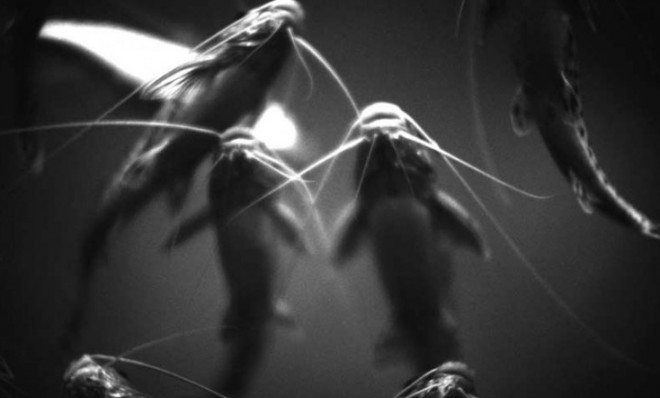The Manti Te'o hoax: What is 'catfishing'?
A crash course in a term you'll be seeing a lot of

A free daily email with the biggest news stories of the day – and the best features from TheWeek.com
You are now subscribed
Your newsletter sign-up was successful
Perhaps you were near a computer late Wednesday when the internet spontaneously combusted upon learning that Manti Te'o, star linebacker for the Notre Dame Fighting Irish, was involved in a heartbreaking, frequently publicized relationship with a young woman who lost her battle with leukemia in September… but didn't actually exist, at least according to a thrilling investigative story published on Deadspin. This, of course, posed a very serious problem for ESPN, The New York Times, and countless other media organizations nationwide that were led to believe Te'o's made-for-TV narrative of bouncing back from tragedy. Te'o says he's deeply embarrassed, and now he and Notre Dame are standing by the claim that the young star was duped into believing this nonexistent girlfriend was real. Te'o, they say, was "catfished."
What is catfishing exactly?
Urban Dictionary's most popular answer defines a catfish as "someone who pretends to be someone they're not using Facebook or other social media to create false identities, particularly to pursue deceptive online romances." Colloquially speaking, getting catfished means you've been tricked into thinking someone you've met on the internet is a real, three-dimensional person — even though they're make-believe. MTV has an entire show dedicated to helping people who have been catfished unmask whoever was behind the trickery.
The Week
Escape your echo chamber. Get the facts behind the news, plus analysis from multiple perspectives.

Sign up for The Week's Free Newsletters
From our morning news briefing to a weekly Good News Newsletter, get the best of The Week delivered directly to your inbox.
From our morning news briefing to a weekly Good News Newsletter, get the best of The Week delivered directly to your inbox.
How do "catfish" ruses get pulled off?
Oftentimes, a real person's photograph is scraped from a stranger's Facebook profile. The catfisher then creates an elaborate (read: believable) backstory, complete with online evidence. (In the Te'o's scandal, Twitter and Instagram accounts were created for his phony girlfriend and her family.) In one episode from the MTV show, a young man named Joe hesitantly strikes up an online "relationship" with a former Miss Teen USA who doesn't exist. In another, a young lady named Kim maintains a 10-year correspondence with a man named Matt who always bails on her whenever they're about to meet in real life. A recent episode of The Dr. Phil Show profiled three attractive women in their thirties who all fell in love with the same handsome man online. Of course, he turned out to be a myth, and the photos actually belonged to an aspiring young actor thousands of miles away.
Where does the name "catfish" come from?
It's from a 2010 documentary of the same name. The film itself received mixed reviews, but it was incredibly popular in the indie community. Here's the trailer:
A free daily email with the biggest news stories of the day – and the best features from TheWeek.com
In the movie, (spoilers ahead) a young, New York City-based photographer befriends a rural Michigan family online after their 8-year-old prodigy writes him to say she's a big fan of his work. Eventually, he strikes up an online relationship with the family's eldest daughter, who sends him mp3s of the songs she writes (which are really just taken from YouTube). The twist is that the various projections of each family member turn out to be perpetrated by a single, bored housewife who spends most of her time looking after her two severely handicapped stepsons. Here she is appearing on 20/20:
Watch More News Videos at ABC | Technology News | Celebrity News
But why "catfish"?
At the end of the film, the catfish's husband tells a story about people like his wife:
They used to tank cod from Alaska all the way to China. They'd keep them in vats in the ship. By the time the codfish reached China, the flesh was mush and tasteless. So this guy came up with the idea that if you put these cods in these big vats, put some catfish in with them and the catfish will keep the cod agile. And there are those people who are catfish in life. And they keep you on your toes. They keep you guessing, they keep you thinking, they keep you fresh. And I thank god for the catfish because we would be droll, boring, and dull if we didn't have somebody nipping at our fin.
Why do people catfish?
Marc Ambinder explores the messy, predatory psychology at his blog, but thinks it has something to do with shame. "Getting rid of the horrible anxiety of shame is made quite easy by the online culture, and it leads to extremes in behavior," he writes. "Shame is a tool that is often exploited; very rarely is it used appropriately. (Lance Armstrong, you should feel, as in really, really feel, shame.)" But perhaps the best explanation for why people catifish is the one offered by the original herself, Angela Wesselman, in the interview above: "I didn't have anything else in my life. This was the only thing I had going for me."